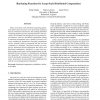Free Online Productivity Tools
i2Speak
i2Symbol
i2OCR
iTex2Img
iWeb2Print
iWeb2Shot
i2Type
iPdf2Split
iPdf2Merge
i2Bopomofo
i2Arabic
i2Style
i2Image
i2PDF
iLatex2Rtf
Sci2ools
105
click to vote
SP
2003
IEEE
2003
IEEE
Hardening Functions for Large Scale Distributed Computations
Many recent large-scale distributed computing applications utilize spare processor cycles of personal computers that are connected to the Internet. The resulting distributed computing platforms provide computational power that previously was available only through the use of expensive supercomputers. However, distributed computations running in untrusted environments raise a number of security concerns, including the potential for disrupting computations and for claiming credit for computing that has not been completed (i.e., cheating). This paper presents two strategies for hardening selected applications that utilize such distributed computations. Specifically, we show that carefully seeding certain tasks with precomputed data can significantly increase resistance to cheating and to disrupting the computation. We obtain similar results for sequential tasks by sharing the computation of Æ tasks among Ã Æ nodes. In each case, the associated cost is significantly less than the co...
Distributed Computations | Distributed Computing | Large-scale Distributed Computing | Security Privacy | SP 2003 |
Related Content
| Added | 05 Jul 2010 |
| Updated | 05 Jul 2010 |
| Type | Conference |
| Year | 2003 |
| Where | SP |
| Authors | Doug Szajda, Barry G. Lawson, Jason Owen |
Comments (0)

